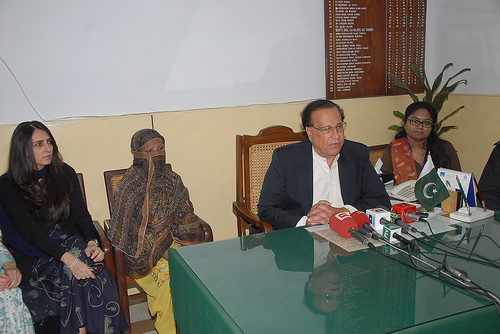Denialistan, Part One
by Bina Shah / May 29, 2012 / 2 Comments
“They had never heard of anyone mistreating or discriminating against Christians in Pakistan…”

Salmaan Taseer, governor of Punjab, visiting Aasia Bibi in prison in 2010. Photo: Salmaan Taseer, Flickr Creative Commons (11/20/10)
I was invited to speak at a private book club that was discussing my recent work Slum Child, a novel about a young Christian girl in a Karachi slum who has to rely on her wits and the kindness of others to survive extremely difficult circumstances. For me, the evening turned out to be a very powerful experience that confirmed my instincts about why I had to write Slum Child.
I arrived at the venue on an extremely hot Karachi evening. The temperature had climbed up to 44 C (111.2 Fahrenheit) during the day, and it was a relief to slip into the restaurant’s air-conditioned depths. At a table, ten members of the book club were waiting for me, copies of Slum Child in front of them.
Almost immediately, two of the book club members began to confront me. They were what I call Denialistanis, people who are extremely touchy about Pakistan’s flaws and can’t accept criticism of any kind about the nation and its inhabitants. They said that in writing Slum Child I was showing a bad side of Pakistan to the world, and that they had never heard of anyone mistreating or discriminating against Christians…
We got into a heated discussion about discrimination against minorities in Pakistan. I asked them about Aasia-Bibi, the poor Christian woman on death row for blasphemy; Salmaan Taseer, the governor of Punjab, who was assassinated in January 2011 after protecting Bibi and criticizing the blasphemy laws; and Shahbaz Bhatti, the Christian minister for Minority Affairs who was assassinated by extremists in March of last year.
They asked me why I chose to write about Christians and not Muslims, since Pakistani Muslims were being killed and treated badly.
Indeed, the War on Terror has brought a terrible sense of victimhood to the Muslim world, especially Pakistan, where we have suffered 30,000 deaths due to terrorist attacks for a war many feel is not ours.
I recognized their pain from the countless humiliations we’ve all had to go through in the last ten years, starting with 9/11/01 and going all the way through the recent capture of Osama Bin Ladin in Abbottabad. As a Pakistani, I knew exactly what that pain felt, looked, talked, and sounded like. But as a member of the powerful majority, it is my duty to speak for and protect our vulnerable minorities.
Read Part Two of Denialistan on June 12, 2012





2 Comments on "Denialistan, Part One"
Well denial is not the way to go of course, but the point is this, keeping in mind the current circumstances that Pakistan is going through, people just wait to hear anything negative about this country, and will gladly and viciously use it to malign Pakistan. This is why we have to play it smart…if the same story was written about a country like America for example, it wouldn’t really matter, as America’s other side is already known to the world, or they have the power of the media to project and defend all sides. But here in Pakistan, we don’t. A person in the US is already so clueless about Pakistan, and the US media would immediately pick up on such a story and blow it up tenfold, without saying the other side, which is that there are several Convent schools in Pakistan, in which majority Muslim students study and hang out normally and happily with their Christian friends, or how some malls here too are decorated for Christmas, or how we have some special shows on TV to wish our Christian community Merry Christmas (I’m sure if you take a survey, not one American would know such things happens, and I”m sure they’d die of shock knowing that Muslims study in a school called The Convent of Jesus in Mary in Karachi!)
So basically keeping this in mind, such stories should either be promoted only in urdu (so ppl in this country realize and get to know what is going on) without it being easy for the rest of the world to pick up on it.
We need to keep in mind the delicate situation Pakistan is in, all this will also adversely affect Pakistan’s economy, with ignorant outsiders not wanting to do business, maybe, just maybe because they’ve heard such a negative story.
So at this point in time, we need to be careful and play it smart. When (hopefully) the time comes when Pakistan is strongly on her own two feet, then such stories can be promoted like stories in the west are.
Or at least the author should as strongly show the good side, along with the negative side. As this story is about the bad things happening to some Christians here, simultaneously stories like St Joseph’s School should be mentioned, and how proud we are to have a 150 yr old Convent school in Karachi, stories of Pakistani Christian musicians who are loved by Pakistanis etc…..
It’s all about timing, not denial, and this is just not the time.
I’m thankful to Bina Shah for sharing info and her evaluation. I love the neologism Denialistan 🙂